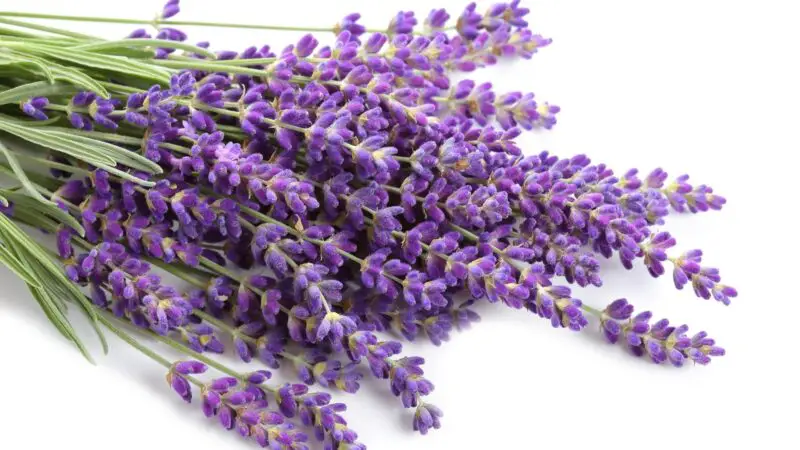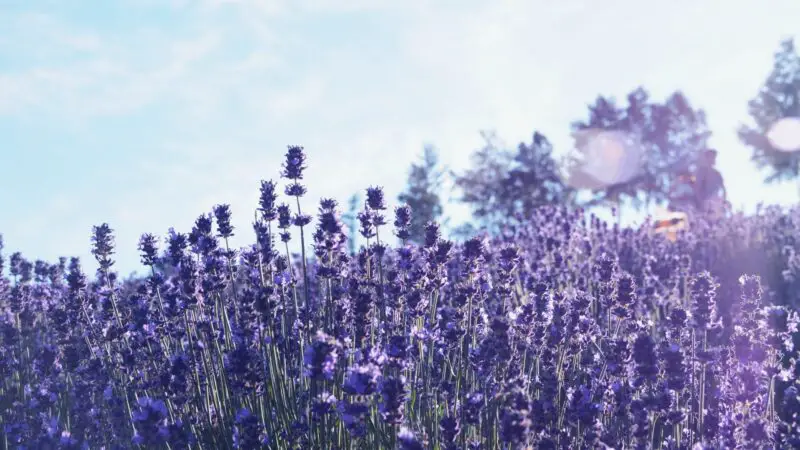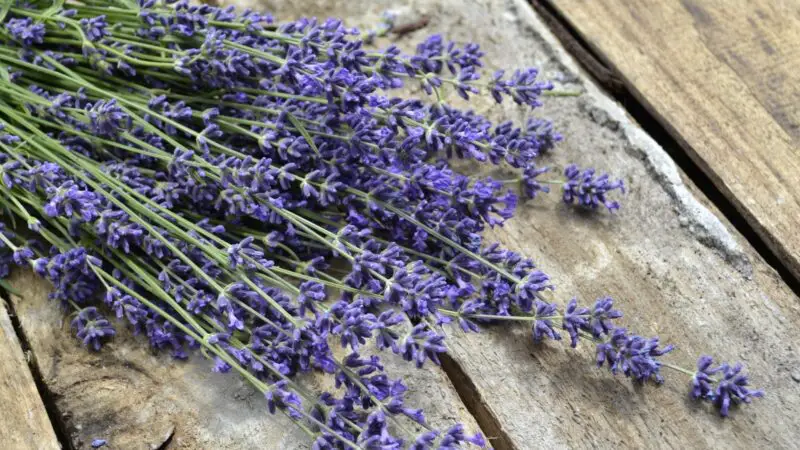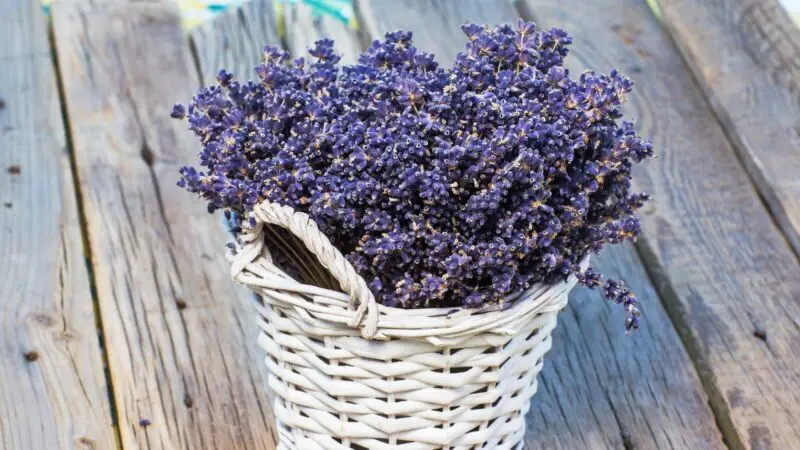Antibiotic growth promoters used in poultry are essential as they prevent diseases, but they are also known for their adverse effects.
So, growers opt for safer alternatives like herbal extracts or essential oils, which are deemed natural antibiotics. However, not all herbs and plants can attract chickens and have antibiotic properties.
Can chickens eat lavender? Chickens can eat lavender. Fresh lavender may not be appealing to some chickens because of its strong smell. You have to dry the plant so they can eat them. However, there are growers that testified that their chickens can eat them fresh when placed on a nesting box or mixed with other herbs.
A study focused on the effects of lavender essential oil when mixed in the chicken’s drinking water.
The findings show that it enhances the growth performance of broiler chickens by improving antioxidant capacity, intestinal structure, and gut microbiota balance. Indeed, lavender can replace antibiotic growth promoters.
What Is a Lavender? What Does It Look Like?

Lavender is from the mint family, and it’s originally from Europe’s Mediterranean region, but it’s grown all around the world these days. There’s no wonder that many grow this plant because of its beautiful color, fragrance, and medicinal properties.
Lavender is a bushy, perennial plant that can grow around one ft. to three ft. It has needle-like foliage with a gray or blue-green hue that carries a scent that is similar to balsam. This plant also produces flowers that are like spikes.
The flowers of lavender can either be lavender or white. These are the most valuable parts of this plant since they’re used to make essential oil.
In addition, lavenders usually bloom in summer with their aromatic flowers, leaves, and seed heads. Furthermore, lavender is associated with cosmetics, perfumery, and household products.
You’ll be impressed by the many uses of this plant. It can be a low hedge that you can grow in a container or mass planting. It’s used in potpourri due to its therapeutic properties.
Also, it’s used as a natural preservative in the food industry, so it can be mixed with dishes that contain pork, chicken, and fish.
Where Is Lavender Mostly Grown?

Lavender is mostly grown in Europe, Australia, and North America.
Can You Grow Lavender Anywhere?
You can’t just grow lavender anywhere you like. This plant thrives in soil with good drainage, and it prefers to be in a dry and sunny environment.
It doesn’t like to be in heavy clays and wet areas. There’s no use planting lavender in these areas as it will only die.
Lavender plants won’t grow healthily when the air circulation is poor, and humidity is high. Based on the description of their preferred environment, they’re drought-tolerant.
But they need regular watering in their first year, so they can establish themselves in facing possible drought.
To prevent moisture from getting into their crown, you have to mulch the plants with inorganic mulches like pea gravel and rock. It’s necessary so foliage diseases won’t occur.
Mulching comes naturally in cold areas for lavender because of evergreen boughs or straws. With several things that this plant requires, growing can be difficult in some places like North Carolina, which is on the southeastern side of the US.
What Are the Health Benefits of Lavender?

Lavender has a long list of health benefits that humans take advantage of for a long time.
All-Around Drug
Lavender is a natural disinfectant, bactericide, and antispasmodic. It’s also a carminative, so it eases out flatulence or gas. Therefore, you can drink it as a tea to relieve bloating and stomach issues.
Calming Effect
It can work on the sensory system and calm a person’s mind. So, it proves to be a remedy for sleeping disorders and anxiety. It’s recommended to put two or three drops of lavender essential on the pillowcase or cushion to achieve the desirable results.
The study conducted at the Medical University of Vienna showed that the intake of lavender oil relieves patients with tension issues and subsyndromal nervousness. Hence, 80 mg of lavender oil packed in a gelatin case can be an anxiolytic that reduces anxiety.
An Antifungal
Lavender has strong antifungal effects, as discovered by researchers at the University of Coimbra in Portugal.
Mending Wound
Manisa Celal Bayar University in Turkey found out that lavender can mend wounds through their study that associates mice.
For Male Baldness
Since this plant can quicken hair growth, NMCB or Natural Medicines Comprehensive Database states that it’s effective in treating alopecia areata, which is a hair loss to any part of the body.
Aromatherapy for Premenstrual Symptoms
The aromatherapy from lavender can relieve premenstrual symptoms. This is supported by the studies conducted in Japan by the Kyoto University, Shitennoji University, and Advanced Reproductive Endocrinology and Infertility. Although PMS is regular, women can find relief in lavender.
Can Chickens Benefit From Lavender Too?

Chickens can benefit from lavender too. As mentioned, you can dry the lavender if you’re not sure whether your chicken will eat it or not.
Supplementation of dried lavender to broiler chicken with a ratio of 400 mg to 1 kg of chicken weight brings a lot of benefits. Lavender can be a natural supplement for broilers as it can improve their health conditions and sustain growth performance.
Should I Be Feeding Herbs to My Chickens?
To not deliver the adverse effects of AGP or antibiotic growth promoters, feeding herbs to your chickens is a safer method. It’s best to stick with it as you keep your chickens from diseases without consequences.
This method is recommended by experts as herbs promote the improvement of gut microbiota balance, the presence of an antioxidant, and intestinal structure. It also lowers the blood cholesterol of the chickens.
Can Chickens Eat Lavender Flowers and Sprigs?
Chickens can eat lavender flowers and sprigs. You may dry these parts if the chickens ignore the fresh ones due to the strong scent. They can also be placed next to a hen to help release the tension of laying eggs. Once the lavender is in the nesting box, she will sometimes peck and eat it.
Any parts of lavender are safe for chickens, but the intake should be in moderation as linalool in this plant is a toxin.
How to Feed Lavender to Chickens?
You can feed lavender to your chickens by the plant itself or the essential oil. If you choose to feed them the stems, leaves, and flowers. It’s best to dry the plant first so you can crush it into powder and mix it with the chicken feed.
In this way, you’ll be able to control the amount of lavender. You can also add lavender essential oil to your chicken’s water.
How Much and How Often to Feed Lavender to Chickens?
When feeding lavender to your chickens, see to it that it’s 10% of their diet, so they won’t experience any toxins. You can give it to them twice a week and replace lavender with other herbs like sage, thyme, and basil.
What Herbs Can Chickens Not Eat?
These are the herbs that chicken can’t eat:
- Aloe Vera
- Bitter Orange
- Comfrey
- Eucalyptus
- Foxglove
- Henbane
- Horse Nettle
- Monkshood or Wolfsbane
- Pennyroyal
- Tansy
- Tea tree or Melaleuca
- Wormwood, Artemesia, or Mugwort
How to Grow a Lavender?
Growing lavender is ideally done in spring and fall. According to New Mexico State University, full-planted lavenders have a high chance to survive. They can establish themselves relatively faster and produce flowers the next season.
The length of lavender for planting depends on the season. When it’s fall, the lavender should be 4-inches long, and you can plant it in a large flower pot for an established root system.
Those that are planted in spring can be shorter since they can have a long time to develop their root system.
When growing lavender as a crop, observe the right spacing, which is 2 to 3 ft within the rows and 3 to 6 ft in between.
The weed barrier is essential as this plant is not tolerant of weeds. Lavenders like to be exposed to the full sun.
Alkaline soil is ideal for lavenders, but heavy soil may be necessary for good drainage. Although they’re drought-resistant, adequate irrigation is still vital. The amount of irrigation will be based on the soil type, weather patterns, and climatic zone.
Summary
Chickens can eat lavender, but you have to mix it with their feeds. It’s also a good method since you have to control the amount so they won’t be intoxicated with linalool.
There are chances that chickens will ignore lavender because of its strong scent. As recommended, you have to dry the plant so they can take it in and gain health benefits.
